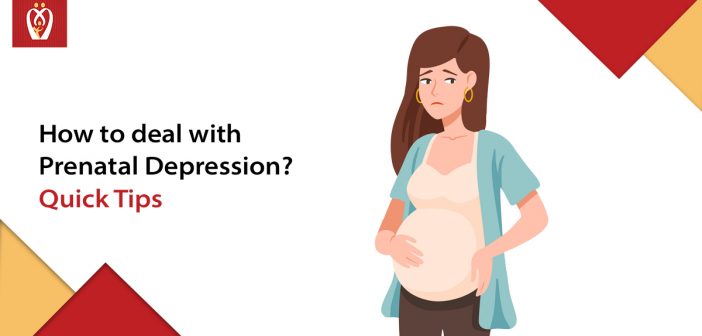Introduction
Pregnancy can be both joyful and stressful. Unfortunately, according to research, roughly 7% of pregnant women experience depression during their pregnancy. In low- and middle-income countries, rates may be greater. Prenatal depression, also known as perinatal depression, is depression that affects women when they are pregnant.
Prenatal (or perinatal) depression, like postpartum depression, isn’t merely a sensation of melancholy; moms who suffer from it may also feel worried and furious. We give you some quick tips on how to deal with prenatal depression.

Symptoms of prenatal depression
Many of the symptoms of depression can occur regularly and be deemed normal. However, if you have at least three of the following symptoms for two weeks or longer, speak with your doctor about treatment options. You don’t have to face depression on your own. You can get assistance if you need.
- fluctuations in mood
- irritability
- melancholy, hopelessness, or a sense of being overburdened
- a lot of sobbing bouts or a lot of crying
- a desire to eat frequently or not at all,
- sleep issues, such as too little or too much sleep makes it difficult to concentrate or make decisions.
- issues with memory
- Feelings of inadequacy or guilt
- Loss of enthusiasm for pleasurable things, or finding that you no longer enjoy them when you do partake
- withdrawing from friends and family, or wishing to separate from friends and family
How does prenatal depression affect pregnancy?
Depression during pregnancy can have a variety of effects on a mother’s health. The following factors can contribute to depression during pregnancy:
- Getting in the way of your abilities to look after oneself. It’s critical to look after your health when pregnant. Depression can make you neglect your personal needs. If you’re sad throughout pregnancy, you may find it difficult to adhere to medical advice, as well as sleep and eat appropriately.
- You are more likely to use dangerous substances as a result of this. Tobacco, alcohol, and illegal narcotics are examples of these substances. Depression may lead to the use of various substances, all of which can be harmful to your pregnancy.
- As your child grows, it gets in the way of your ability to bond with them. Your kid may hear you speak and perceive emotion from the pitch, rhythm, and stress in your voice while still in the womb (uterus). If you are depressed during your pregnancy, it may be difficult to form this bond with your kid. You may be feeling emotionally alone.
Dealing with prenatal depression
Prenatal Depression is typically treated with a mix of medication and psychotherapy. However, during pregnancy, you and your doctor will need to consider the dangers of medicine against the advantages. If antidepressants are appropriate for you, your doctor will prescribe them to help you address the underlying cause of depression.
Consider talking therapy with a social worker, psychologist, or psychiatrist, whether or not prescription medicines are a possibility for you. You might be able to discover free or low-cost counselling choices in your area if your insurance doesn’t cover mental health care. Ask your doctor for aid if you’re having problems finding someone to assist you with your treatment.
- Women suffering from prenatal depression can benefit from a variety of psychotherapies (sometimes known as “talk therapy” or “counselling”). Cognitive behavioural therapy and interpersonal therapy are two evidence-based treatments that have been used to treat prenatal depression.
- Interpersonal therapy (IPT) is a depression treatment that has been proven to work, particularly prenatal depression. It is founded on the notion that interpersonal and life events impact mood and vice versa. IPT’s purpose is to assist people in improving their interpersonal communication skills, building social support networks, and setting realistic expectations that will allow them to deal with crises or other situations that may contribute to their melancholy.
- Antidepressants, which are drugs used to treat depression, are the most common treatment for prenatal depression in women. They may aid in the betterment of the brain’s usage of specific hormones that regulate mood and stress. Pregnant or lactating women should tell their doctor before starting antidepressants so that their doctor can strive to reduce the medication’s exposure to the baby during pregnancy or breastfeeding. The risk of birth abnormalities and other difficulties in babies born to mothers who take antidepressants during pregnancy is extremely low; however, women should consult with their doctor to assess the risks and advantages of therapy and find the best approach for their particular circumstances. Antidepressants take time to act (typically 6–8 weeks), and symptoms including sleep, hunger, and attention issues generally improve before mood improves. Before evaluating whether or not a drug works, it is critical to give it a chance. Stopping antidepressants without consulting a doctor or other health care practitioner is not a good idea.
- It is crucial to recognise that depression is a medical problem that affects the mother, the kid, and the entire family. A new mother’s spouse, partner, family members, and friends may be the first to notice symptoms of prenatal depression. The importance of treatment in the rehabilitation process cannot be overstated. Family members can urge the mother to seek medical help, provide emotional support, and help with daily responsibilities such as baby care or household chores.
- Lifestyle changes-
- Exercise can help control your emotions through yoga, meditation, gentle exercise, journaling, and mindfulness exercises.
- Finding prenatal depression support groups might also be therapeutic. Postpartum Support International will help you find such groups. There are also numerous online support groups.
- Remember to set aside time for yourself. We parents (and soon-to-be moms) frequently spend so much time giving to others that we forget to nourish ourselves and our spirits. Make time for yourself at least once a week. Even an hour or two of doing something you enjoy, such as reading your favourite book alone, can benefit your mental health.
- It’s time to talk about it. Having loved ones with whom you may “vent” is extremely vital, in addition to your therapist and support group. Seek out people who will listen to you without condemning you and are concerned about your emotional well-being.
Prenatal depression NHS
The NHS Long Term Plan builds on the Five Year Forward View for Mental Health’s objectives to transform specialist PMH services across England. By 2023/24, they want to ensure that at least 66,000 women with moderate/complex to severe PMH issues have access to community-based care and support. Additional funding will be made available as part of the £2.3 billion investment in mental health identified in the Long Term Plan to assist in developing perinatal mental health services. The Mental Health Implementation Plan lays everything out in great detail. This includes the following:
- Increasing specialised PMH community care duration for mothers who require continuous assistance from 12 to 24 months after birth.
- Increasing women’s and their partners’ access to evidence-based psychological therapy
- Mental health screenings for partners of people who use specialised PMH community services and referrals to help if needed.
They will also seek to make it easier to get psychological help for those with mental health problems as a result of or related to their pregnancy by establishing Maternity Outreach Clinics.
How is Nurturey helping in dealing with prenatal depression?
As one of the best maternity apps, Nurturey’s PinkBook offers pregnant women the same intuitiveness and inventiveness. The PinkBook seamlessly assists women as they navigate their pregnancy adventure, whether it’s scheduling an appointment with a GP surgery-linked midwife, receiving reminders of upcoming scans and tests, promoting a kick counter tool to monitor baby’s movements, or receiving trusted advice directly from the NHS.
Conclusion
When having a baby, it’s all too easy to get caught up in our growing tummy and the anticipation of our bundle of joy’s arrival. It’s all too easy for expectant mothers to get forgotten in the shuffle. It’s usual for pregnant women to experience a wide range of emotions, and not all of them are happy. Pregnant women can become lost in their feelings and develop signs of prenatal depression as a result. It’s critical to realise that you’re not alone if you’re experiencing symptoms of this condition and there is assistance available.




